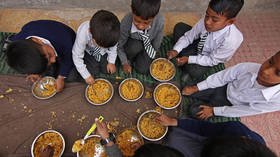India rejects Global Hunger Index ranking, citing ‘malafide intent’

The Indian government has rejected the new edition of the Global Hunger Report 2023, which ranks India 111th out of a total of 125 countries. In a statement on Thursday, the country’s Ministry of Women and Child Development cited “serious methodological issues,” noting that the Global Hunger Index “continues to be a flawed measure of ‘hunger’ and does not reflect India’s true position.”
The Global Hunger Index is released by NGOs Concern Worldwide and Welt Hunger Hilfe, from Ireland and Germany, respectively. It is considered a tool for comprehensively measuring and tracking hunger at the global, regional, and national levels.
The new edition gave India a score of 28.7, noting that the country has a “serious” level of hunger. According to the report, undernourishment in India stands at 16.6% and the mortality rate for children below the age of five is 3.1%. It also showed that India has the highest child ‘wasting’ (the term describing low weight relative to height) rate in the world, at 18.7%, which reflects acute undernutrition.
The index also claims that 58.1% of Indian women aged 15-24 suffer from anemia, a condition in which the body does not have enough healthy red blood cells.
Notably, India was ranked below neighboring countries Pakistan (102th), Bangladesh (81st), Nepal (69th), and Sri Lanka (60th). In 2022, India ranked 107th out of 121 countries surveyed – again, well below its neighbors.
“Three out of the four indicators used for calculation of the index are related to the health of children,” the Health Ministry said in a statement, positing that it therefore, “cannot be representative of the entire population.”
The government further pointed out that the fourth and “most important indicator,” the ‘proportion of undernourished (PoU) population’, is based on an opinion poll conducted on “a very small sample size of 3,000.” “The data collected from a miniscule sample for a country of India’s size through FIES has been used to compute PoU value for India which is not only wrong and unethical, it also reeks of obvious bias,” the statement reads.
The Health Ministry also claimed that the index didn’t use data collected via the government application called the Poshan Tracker, which was created as part of the drive to address malnutrition. This is despite the fact that key international organizations, including UNICEF, WHO, and the World Bank, “have acknowledged the Poshan Tracker as a game-changer in the area of nutrition,” the statement said.
Based on data from the Poshan Tracker, the percentage of child ‘wasting’ in India is consistently below 7.2% month-on-month, which is in stark contrast to the 18.7% value in the Global Hunger Index 2023.
The statement also pointed out that “there is hardly any evidence” that child mortality is an outcome of hunger.
The Indian government allocated over 112 million metric tonnes of food grains under its food security scheme during the financial years 2020-21 and 2022-23, benefitting nearly 80 million people. It extended the scheme in January 2023, the statement added, calling it the “largest food security program in the world.”













